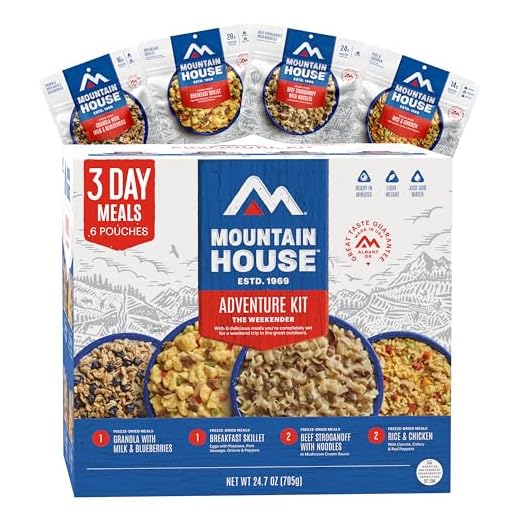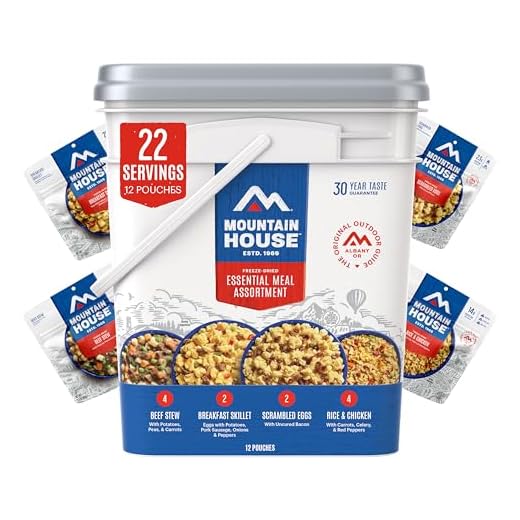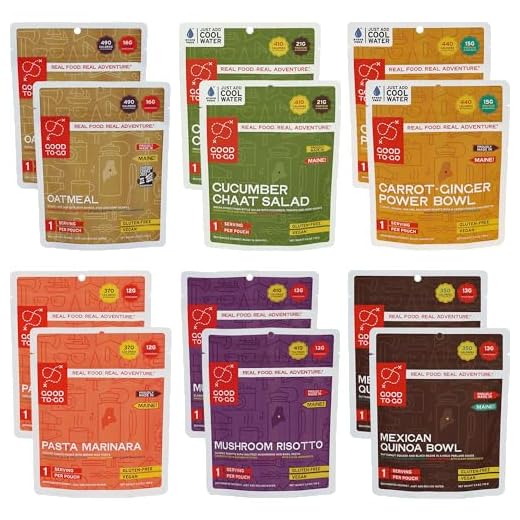



Target numbers: 3,000–5,000 kcal per day depending on exertion; protein goal 1.2–2.0 g/kg bodyweight (for a 70 kg person aim for ~85–140 g/day); choose items with >4 kcal/g when possible to minimize pack weight.
High-density examples (approx. kcal per 100 g): mixed nuts 600 kcal, peanut butter 588 kcal, chocolate 545 kcal, olive oil 884 kcal, hard cheese ~400 kcal, cured salami ~400 kcal, energy bars 400–480 kcal, instant oats 380 kcal, dehydrated meals 300–450 kcal (dry weight). Jerky provides ~25–35 g protein per 100 g and ~300–350 kcal.
Practical packing rules: pre-measure daily rations with a small digital scale; vacuum- or zip-seal into day-sized bags; carry a 20% calorie buffer for delays; favor no-cook or single-boil meals to reduce fuel; store oils and sauces in small, leak-proof containers (20–30 g olive oil = ~175–265 kcal added per meal).
Water and rehydration: expect to need 2–4 L drinking water per person per day depending on temperature and effort, plus 0.5–1 L extra for rehydrating dried meals and cooking. Rehydrate cold when possible to save fuel; if water sources are scarce, prioritize instant/no-cook items and concentrated fats.
Sample single-person daily menu (~3,350 kcal, ~760 g dry weight): Breakfast: 100 g instant oats (380 kcal) + 30 g powdered milk (150 kcal) + 20 g dried fruit (65 kcal) + 20 g peanut butter (118 kcal) = 713 kcal, 170 g. Lunch: two tortillas 120 g (300 kcal) + 50 g salami (200 kcal) + 40 g peanut butter (235 kcal) = 735 kcal, 210 g. Snacks: 150 g mixed nuts (900 kcal) + 60 g energy bar (240 kcal) + 30 g chocolate (160 kcal) = 1,300 kcal, 240 g. Dinner: 120 g dehydrated meal (540 kcal) + 20 g olive oil (177 kcal) = 717 kcal, 140 g.
Packing and spoilage tips: use hard cheeses and cured meats within the first 3–5 days if not refrigerated; vacuum-sealed freeze-dried dinners can last years; avoid single-use wrappers by repacking into resealable bags to reduce weight and trash. Place highest-calorie items near the hip zone for balance and quick access to emergency calories.
Adjust quantities upward for colder conditions or steeper terrain; test a sample menu on a day hike to confirm palatability and digestion before committing to multi-day outings.
Lightweight high‑calorie breakfasts for cold mornings
Aim for 600–900 kcal per person at breakfast; prioritize fats (≈9 kcal/g) plus quick carbs to raise core temperature and sustain effort. Example target: 700 kcal delivered in 130–180 g dry weight keeps pack weight low while giving sustained energy.
Recipe A – Hot oat mash (cooks in 3–5 min): 70 g instant oats (70×3.9 = 273 kcal), 30 g whole milk powder (30×5.0 = 150 kcal), 30 g peanut butter (30×5.9 = 177 kcal), 10 g honey (10×3.0 = 30 kcal). Total ≈ 630 kcal; dry weight 140 g. Water 160–210 ml (1:1.5–1:3 ratio); simmer 2–4 minutes. Pack: vacuum bag with pre-measured dry mix + single‑serve oil/peanut butter pouch to reduce mess.
Recipe B – Granola milk bowl (no full boil required): 80 g high‑fat granola (80×4.5 = 360 kcal), 25 g powdered milk (25×5.0 = 125 kcal), 15 g coconut oil (15×8.62 = 129 kcal), 20 g chopped mixed nuts (20×6.0 = 120 kcal). Total ≈ 734 kcal; dry weight 140 g. Preparation: pour 150–200 ml hot water, stir, let sit 1–2 minutes. Good when stove time must be minimal.
Recipe C – Zero‑cook calorie stack: two dense bars (2×280 = 560 kcal), 30 g almond/peanut butter pouch (30×5.9 = 177 kcal), 40 g dates or dried fruit (40×3.2 = 128 kcal). Total ≈ 865 kcal; no stove needed, dry weight ~170 g. Best as contingency for very cold nights when stove use is limited.
Practical notes: use whole‑milk powder for calorie density (≈5 kcal/g) instead of instant coffee‑style powders; add 1 tbsp oil (≈14 g → 120 kcal) to any hot meal for rapid caloric boost; single‑serve oil or nut‑butter pouches cut prep time and waste. For rehydration, aim to heat only the water volume required (avoid full kettles) to save fuel and speed up service; instant oats accept 1:1.5–1:2 water, granola needs less hot water and short soak.
Storage and weights: pre‑weigh daily portions into labeled vacuum or zip bags (reduces on‑trail measuring). Calorie density benchmarks to plan by weight: nut butter ≈5.8–6.0 kcal/g, nuts ≈6 kcal/g, oils ≈8.6 kcal/g, powdered dairy ≈5 kcal/g, oats ≈3.9 kcal/g. Use those figures to build a desired kcal/100 g target for each morning.
No‑cook lunches for quick midday refuel
Plan for 500–800 kcal per midday meal with ~20–30 g protein, 50–80 g carbs and 15–30 g fat to restore energy and muscle function without cooking.
Protein-packed tuna & cheese wrap – ingredients: 1 large tortilla (60–75 g, 210–260 kcal); 1 tuna pouch (70–85 g, 100–140 kcal, 18–22 g protein); 30 g hard cheese (120 kcal, 7–8 g protein); 1 tbsp olive oil or mayo packet (90–120 kcal). Estimated total: 520–640 kcal; weight ~220–270 g; protein 25–30 g. Assembly: drain pouch, spread oil/mayo thinly, add cheese, roll tightly in foil or parchment.
Calorie-dense nut-butter wrap – ingredients: 1 tortilla (60–75 g, 210–260 kcal); 2 tbsp peanut or almond butter (32 g, 180–200 kcal); 1 tbsp honey or jam (20–25 g, 60–80 kcal); 25 g mixed nuts (150 kcal). Estimated total: 600–690 kcal; weight ~150–200 g; protein 12–16 g. Weight-saver option: powdered nut butter rehydrated on the trail reduces carried weight by ~40–50%.
Mediterranean pita kit – ingredients: 1 small pita (60 g, 150–170 kcal); single-serve hummus (60–80 g, 120–180 kcal); 30 g salami or pepperoni (120–160 kcal); 30 g olives or sun‑dried tomatoes (80–120 kcal). Estimated total: 470–630 kcal; weight ~200–260 g; protein 12–20 g. Keep hummus sealed until eating to avoid soggy bread.
High-energy micro-additions to adjust totals: 28 g almonds (160–170 kcal), 32 g peanut butter (180–200 kcal), 28 g beef jerky (110–130 kcal), single energy bar (220–300 kcal), olive oil blister (1 tbsp = 120 kcal). Add one or two to push a base meal toward 800–900 kcal on high-exertion days.
Packing and shelf-life guidance: choose hard cheeses (aged cheddar, gouda) and shelf-stable protein pouches; unopened pouches and sealed nut butter withstand heat for many days, while soft cheeses and cut fruit spoil faster. Remove bulky retail packaging, vacuum or compress in zip bags to save space. Use separate leakproof bags for wet items (hummus, oil, mayo) and assemble wraps just before eating to preserve texture.
Quick-prep routine: pre-portion sauces into 10–15 g squeeze bags, pre-slice cheese into 20–30 g portions, and pack each lunch in a single sandwich bag so on-break assembly takes under 60 seconds. Carry an electrolyte sachet to replace salts without extra weight.
Compact dinners that require minimal cooking
Primary recommendation: single-serving freeze‑dried entrees (120–160 g dry) boosted with a 60–90 g protein pouch and 15–25 g fat (olive oil or nuts) deliver 700–1,000 kcal; rehydrate with 300–400 ml boiling water, cover for 7–10 minutes, total burn time under 10 minutes, estimated canister fuel per meal ~12–18 g.
Instant couscous bowl – 80 g couscous (≈300 kcal), 25 g powdered cheese (≈100 kcal), 60 g tuna pouch (≈120 kcal), 15 g olive oil (≈135 kcal) = ~655 kcal; add 220–260 ml boiling water, stir, cover 5 minutes. Dry weight ~180 g; pack in a lightweight zip bag to save space.
Dehydrated chili + instant rice – 120 g chili (≈450 kcal) + 60 g quick-cook rice (≈220 kcal) = ~670 kcal; pour 350 ml boiling water into pot, simmer 2–3 minutes then steep 6–8 minutes off-heat; one-pot, minimal stirring, fuel ~15–20 g.
Instant mashed potatoes skillet – 90 g potato flakes (≈330 kcal) mixed with 25 g powdered milk (≈100 kcal) and 30 g cured sausage or salami (≈150 kcal) + 10 g butter packet (≈72 kcal) = ~652 kcal; use 200–250 ml hot water, stir to creamy consistency, 3–5 minutes active prep.
Ramen upgrade – standard instant noodles (90–110 g ≈400 kcal) + 50 g freeze‑dried vegetables (≈60 kcal) + 45 g shelf‑stable chicken or tofu pouch (≈120 kcal) + 10 g peanut butter packet (≈60 kcal) = ~640 kcal; boil 400 ml water, add noodles and toppings, simmer 2–3 minutes, cover 2–3 minutes.
Rice porridge (congee) rapid – 60 g instant oats or quick rice (≈250–300 kcal) + 40 g powdered egg/protein powder (≈160 kcal) + 20 g sesame oil (≈180 kcal) = ~590–640 kcal; use 300–350 ml boiling water, low simmer 4–6 minutes, finish with soy sauce packet and dried scallions.
Packing and prep tips: pre‑mix spices and dry add‑ins into single‑serve vacuum or zip bags labeled with required water volume and steep time; weigh each dinner target 180–300 g dry to hit 600–1,000 kcal range for colder nights; carry 1–2 extra fuel grams per meal as contingency.
If campsite shelter matters when cooking or eating in rain, consider low‑profile coverings like best outdoor cantliver umbrellas or ultralight options such as best ultralight hiking umbrella.
Snack pairings to maintain steady energy on long climbs
Aim for 30–45 g carbohydrates + 8–12 g protein + 6–12 g fat per snack (~220–320 kcal) every 45–60 minutes during sustained climbs.
Pair a fast-absorbing carb (gel, gummy, medjool date, or rice cake) with a compact protein/fat source (nuts, nut-butter packet, hard cheese, or beef jerky) to smooth blood sugar and prolong satiety; pack one quick-carb + one slow-burning item per snack slot.
| Quick carb | Slow-burning partner | Serving | Calories | Carbs (g) | Protein (g) | Fat (g) | Weight (g) | Storage |
|---|---|---|---|---|---|---|---|---|
| Energy gel | 10–12 g almonds | 1 gel + 12 almonds | 220 | 40 | 5 | 10 | 35 | Shelf-stable |
| Dried apricots (6) | 1 mini peanut-butter packet (16 g) | 6 apricots + 1 pkt | 260 | 44 | 6 | 9 | 60 | Shelf-stable |
| Rice cake | 1/2 soft cheese wheel (30 g) | 1 cake + 30 g cheese | 230 | 34 | 9 | 9 | 60 | Short cool window (cheese) |
| Medjool dates (2) | Walnut halves (30 g) | 2 dates + 30 g walnuts | 300 | 48 | 6 | 15 | 65 | Shelf-stable |
| Sports chews (1 pack) | Beef jerky (25 g) | chews + 25 g jerky | 250 | 38 | 12 | 8 | 55 | Shelf-stable |
| Banana (small) | Sunflower seed mix (35 g) | 1 banana + 35 g mix | 280 | 40 | 7 | 12 | 150 | Perishable (short) |
Timing and composition
Target 30–60 g carbs per hour (typical: 45 g/hr). For climbs >3 hours include at least one higher-protein snack (12–20 g protein) within the first two hours to limit muscle catabolism. Add 200–500 mg sodium per hour according to sweat rate; if temperature is high, bias toward the upper end.
Sample quick pack
Example for a 4‑hour ascent: pack 4 carb items (gels or 2 small dates each) + 4 protein/fat items (40 g mixed nuts or 1 nut-butter pkt + 20–30 g jerky). Estimated total ~1,000–1,400 kcal, carried weight ~350–500 g. Keep combos within reach and consume one combo every 45–60 minutes; adjust portions based on perceived effort and sweat losses.
Meal plans for common dietary restrictions and allergies
Plan for 2,500–3,500 kcal per day with ~40–60 g protein; allocate ~25–35% calories to fats and pack concentrated calorie items (nuts alternatives, oils, powdered mixes) that match your restriction.
Three-day sample menus by restriction (calories and weights included)
-
Gluten-free
- Day 1: Breakfast – instant quinoa porridge (90 g dry ≈ 380 kcal); Lunch – tuna pouch (100 g ≈ 200 kcal) + rice cakes (50 g ≈ 190 kcal); Dinner – dehydrated chili with dehydrated beans (120 g rehydrated ≈ 650 kcal).
- Day 2: Breakfast – cornmeal polenta with olive oil (80 g ≈ 360 kcal); Lunch – shelf-stable chicken breast slices (85 g ≈ 180 kcal) + quinoa salad pouch (100 g ≈ 220 kcal); Dinner – gluten-free ramen + textured vegetable protein (TVP) (total ≈ 700 kcal).
- Day 3: Breakfast – powdered egg replacer scramble with smoked salmon (serving ≈ 400 kcal); Lunch – chickpea snacks (60 g ≈ 300 kcal) + dried fruit (40 g ≈ 150 kcal); Dinner – instant risotto with canned mushrooms (≈ 650 kcal).
-
Dairy-free / Lactose-intolerant
- Day 1: Breakfast – coconut milk powder porridge (85 g ≈ 420 kcal); Lunch – peanut-free seed butter wrap alternative (sunflower seed butter 50 g ≈ 300 kcal) + jerky (40 g ≈ 120 kcal); Dinner – curry with dehydrated lentils and coconut milk powder (≈ 750 kcal).
- Day 2: Breakfast – oat flakes with coconut oil and dried banana (80 g ≈ 420 kcal); Lunch – canned salmon + corn chips (≈ 500 kcal); Dinner – instant polenta with olive oil and TVP (≈ 700 kcal).
- Day 3: Breakfast – chia seed pudding made with coconut milk powder (serving ≈ 420 kcal); Lunch – hummus single-serve + rice crackers (≈ 480 kcal); Dinner – rehydrated vegetable stew with added olive oil (≈ 700 kcal).
-
Nut-free
- Day 1: Breakfast – powdered whole-milk substitute (pea protein) porridge (≈ 400 kcal); Lunch – roasted chickpeas (80 g ≈ 350 kcal) + canned tuna (≈ 200 kcal); Dinner – dehydrated beef stroganoff (≈ 750 kcal).
- Day 2: Breakfast – instant oats with flaxseed and brown sugar (≈ 420 kcal); Lunch – hard cheese alternatives (if tolerated) or soy jerky + corn tortillas (≈ 500 kcal); Dinner – dehydrated pasta with meat sauce (≈ 800 kcal).
- Day 3: Breakfast – granola made without tree/peanut components (60 g ≈ 320 kcal) + powdered milk (≈ 200 kcal); Lunch – lentil salad pouches (≈ 450 kcal); Dinner – instant risotto with added olive oil and Parmesan alternative (≈ 700 kcal).
-
Vegan
- Day 1: Breakfast – soy protein powder shake + oats (≈ 500 kcal); Lunch – dehydrated bean stew + whole-grain crackers (≈ 600 kcal); Dinner – TVP curry with coconut milk powder and rice (≈ 800 kcal).
- Day 2: Breakfast – nut-free seed butter on dehydrated bread (≈ 450 kcal); Lunch – quinoa pouch + roasted soy chunks (≈ 650 kcal); Dinner – dehydrated vegetable risotto with added olive oil (≈ 700 kcal).
- Day 3: Breakfast – instant muesli with soy milk powder (≈ 480 kcal); Lunch – shelled edamame snacks (≈ 350 kcal) + dried fruit (≈ 150 kcal); Dinner – vegan mac and cheese (powdered cheese alternative + pasta) (≈ 800 kcal).
-
Low-FODMAP / IBS-sensitive
- Day 1: Breakfast – rice flakes with lactose-free milk powder and maple syrup (≈ 380 kcal); Lunch – canned tuna in oil + gluten-free rice cakes (≈ 420 kcal); Dinner – plain instant potatoes with chicken jerky and olive oil (≈ 700 kcal).
- Day 2: Breakfast – scrambled egg powder with chives (if tolerated) (≈ 420 kcal); Lunch – carrot sticks (dehydrated rehydrated) + pumpkin seed butter (if tolerated) (≈ 500 kcal); Dinner – white rice pasta with herb-infused oil and shrimp (if allowed) (≈ 750 kcal).
- Day 3: Breakfast – buckwheat porridge with coconut oil (≈ 400 kcal); Lunch – grilled chicken slices + cucumber (dehydrated rehydrated) (≈ 450 kcal); Dinner – polenta with garlic-infused oil (avoid whole garlic) and canned fish (≈ 750 kcal).
-
Egg-free / Shellfish allergy
Trending NowGOOD TO-GO Vegan Food KitTasty, easy-to-prepare vegan mealsThis dehydrated meals kit offers delicious options that retain their texture and nutrients, designed for serious backpackers looking for better-tasting meals.- Day 1: Breakfast – oatmeal with fruit and sunflower seed butter (≈ 450 kcal); Lunch – turkey jerky + rice crackers (≈ 500 kcal); Dinner – dehydrated beef and vegetable stew (≈ 800 kcal).
- Day 2: Breakfast – chia pudding (no egg) with coconut powder (≈ 420 kcal); Lunch – cheese alternatives (if dairy tolerated) + apple slices (≈ 450 kcal); Dinner – pasta with meat sauce (no shellfish) (≈ 750 kcal).
- Day 3: Breakfast – granola (egg-free) with powdered milk substitute (≈ 480 kcal); Lunch – roasted soy nuts (if no nut allergy) + dried mango (≈ 500 kcal); Dinner – rice and turkey chili (≈ 800 kcal).
Packing, preparation, and allergy-safety checklist
- Label all sealed packs with allergen info and meal assignment; use zip-locks or vacuum bags to isolate items (weight saved: vacuum ≈ 5–20 g per pack).
- Choose single-ingredient, shelf-stable proteins: tuna pouches (≈ 100–120 g each, 180–220 kcal), shelf-stable chicken (≈ 85 g, 150–200 kcal), TVP (20 g dry ≈ 80–100 kcal after rehydration per serving).
- Swap common allergens with measured equivalents: 1 tbsp nut butter ≈ 100 kcal → sunflower seed butter 1 tbsp same kcal; 30 g nuts ≈ 180 kcal → 30 g roasted chickpeas ≈ 150–160 kcal + carry extra oil for fat boost (1 tbsp olive oil = 120 kcal).
- Pre-portion spices and sauces into 5–10 g single-use sachets to avoid cross-contact; label sachets for each meal.
- Pack a small dedicated cooking utensil and bowl for allergen-sensitive meals; store it in a separate bag to reduce contamination risk.
- Medicines: carry two doses of prescription epinephrine (EpiPen), an antihistamine, written allergy action card, and a compact first-aid kit; keep them in an accessible pocket.
- Rehydration times and boil guidance: TVP 5–8 min simmer; instant grains 3–7 min; dehydrated meals 8–12 min depending on cut size–test at home to confirm timing and water needs (typically 250–400 ml).
- Calorie-dense add-ons to carry for all restrictions: olive oil packets (120 kcal/tsp), powdered MCT oil (variable), powdered milk alternatives (pea/soy/coconut) ~120–140 kcal per 30 g scoop.









